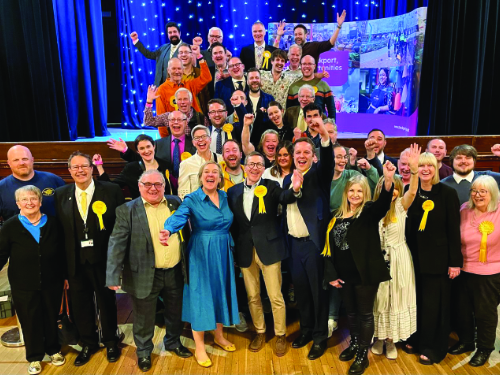
When Stockport faced all-up elections in 2024, we knew it was going to be a huge task. Normally, we need 21 candidates for a full slate – but this time, we needed 63.
Standing a full slate at every election is vital for our electoral credibility. It shows voters that we are a serious political force across the whole borough, gives us visibility in every community, and ensures we maximise our overall vote share.
All-up elections are a particular challenge, and one that we aren’t used to in Stockport. Stockport is a Metropolitan Borough Council and operates with elections in thirds, meaning we only have to deal with all-ups when there are boundary changes.
You need to be well ahead in your target seats, I would be disappointed for Stockport if we did not have target seat candidates selected at this point in the cycle for the 2026 elections. Longer run-ins in seats mean better results, higher name recognition, and give us a real chance to get our candidate across.
This is not to say those selected late can’t win (of course they can!), but we do not give ourselves the best chance by waiting. Additionally, because recruitment and selection can take longer in target wards we cannot afford to let them wait. Otherwise we will not have time for the non-target wards. The earlier you start, the better your chances of finding and approving strong candidates, and of making sure all your due diligence is done correctly. Planning reduces electoral risk, and there is no good reason not to get on with it.
As with everything in politics there is no moving forwards on candidates without asking! We began of course with target seats and candidates who were excited to stand; strong community champions that our existing councillors and activists had already been working with in the community, or dyed in the wool Lib Dem members who had decided they were keen to represent their community.
After target seats we have the tricky challenge of non-target wards. We began by asking our members to stand as paper candidates, then moved on to key supporters, and in the very hardest-to-reach seats we asked friends and family members (although they all had to join to stand).
Honest conversations are needed up front with non-target candidates. Even standing in a seat we are extremely unlikely to win means joining the party, filling in forms, going through approval interviews and making sure you sign your nomination papers. We do a disservice to those who would help us if we don’t clarify that up front. Equally we should be honest and sensible, in some councils there are seats we have won by accident. If the seat is a non target seat but, somehow, there is a possibility of it becoming a target, or us winning it we MUST say that up front. Please be clear with what support will be given to candidate in advance – will they be asked to get their own nominations signed? Will they be expected to campaign? Will they be expected to go to the count? Upfront honest communication is always the key to keeping strong relationships.
Diversity amongst your candidates is important, both in target seats and non-target seats. In our target seats we want to build a council team who represent our whole community, and as such make better decisions. That means engaging with everyone, from all backgrounds. Doing things late is not an excuse to end up with 63 white men as your slate, and that won’t help you win or make good decisions. By fielding a diverse slate, you can show your ambition and engage different communities.
You can find all the latest rules and guidance in the ALDC Approval and Selection Toolkit. Make sure you are following the correct procedures and maintaining good records. Due diligence is critical: a problem with a candidate, even in a ward we don’t expect to win, can have an impact anywhere in the borough. In Stockport, we take a pass/fail approach to candidate due diligence; we don’t have a separate “paper candidate” category because of the political risk that poses.
To make this possible, it helps to keep a list of approved candidates throughout the cycle that’s larger than your total number of seats. That way, you’re not starting from scratch when a full slate or unexpected vacancy arises. It’s also important to make sure your Candidate Approvals Chair understands the scale of the task – how many panel dates might be required – and that you support them with the organisation and scheduling.
At the time of the all-ups, I was serving as Chair of the Coordinating Committee, but it was our Chair of Approvals who did most of the heavy lifting. It was a big job, and they did it brilliantly – but it shows how demanding the process can be if you leave it late.
If you’re facing all-up elections, start early. Do it now! Getting ahead of the process is the single best way to make sure you have strong, credible, and diverse candidates ready to stand everywhere.